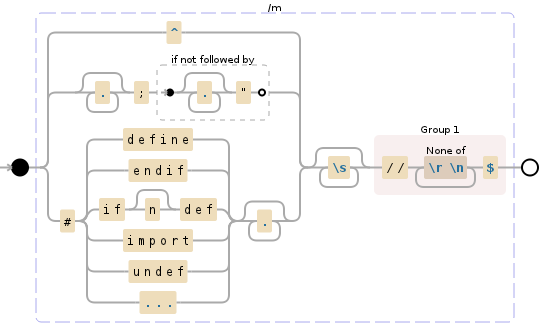
Reputation: 3145
How to strip single-line comments in obj-c properly
I know there are a lot of resources with regex for it. But I could not find the one I want.
My problem is:
I want to remove one line comments (//) from obj-c sources, but I don't want to break the code in it. For instance, with this regex: @"//.*" I can remove all comments, but it also corrupts string literal:
@"bsdv//sdfsdf"
I played with non-capturing parentheses (?:(\"*\")*+), but without success.
Also I found this expression for Python:
r'(\".*?\"|\'.*?\')|(/\*.*?\*/|//[^\r\n]*$)'
It should cover my case, but I've not figure out how to make it work with obj-c.
Please, help me to build proper regex.
UPDATE: Yeah, that's a tough one, I know there're a lot of caveats, other than the one I described. I would appreciate if someone post regex that only fix my issue. Anyway, I gonna post my solution, without regex soon, I hope it will be helpful for anyone who struggling with such problem too.
Upvotes: 0
Views: 187
Answers (1)
Reputation: 43053
Try this regex:
(?:^|.*;(?!.*")|#(?:define|endif|ifn?def|import|undef|...).*)\s*(//[^\r\n]+$)
Demo
Description

Discussion
Besides all the warnings expressed in the comments, I assume that a single line can appear in two distinct cases:
- Case 1: Alone on its line preceded or not by blank chars
- Case 2: Not Alone on its line preceded or not by blank chars, and other chars.
In the first case, we match the beginning of the line (^ with /m flag). Then we search zero or more blank chars (\s*) and finally the single line comment: //[$\r\n]+$.
In the second case, if there are other chars on the line, they form statements. Any statement is ended by a semicolon ;. So we search the last statement and its corresponding semicolon .*;(?!.*"). Then we search the single line comment. Those other chars can be also preprocessor statements. In this case, they are introduced by a sharp #.
One important keypoint is that I assume the code passed to the regex is a code that compiles.
There is more
Don't forget also to add some other pre-processor directives that may apply in your case. Check this SO answer: https://stackoverflow.com/a/18014883/363573
Upvotes: 2
Related Questions
- Regex only match multiline Comments
- iOS how do I remove all extra lines in nsstring
- Removing all multi-line comments
- Remove multi-line C style /* comments */ using Perl regex
- Regex code for removing single and multi-line comments from C code
- How to strip comments from a file with NSRegularExpression
- Stripping multiline comments in C++ with RegEx
- How to strip C++ style single line comments (`// ...`)
- reg expression in objective c fails on new line
- Strip out C Style Multi-line Comments